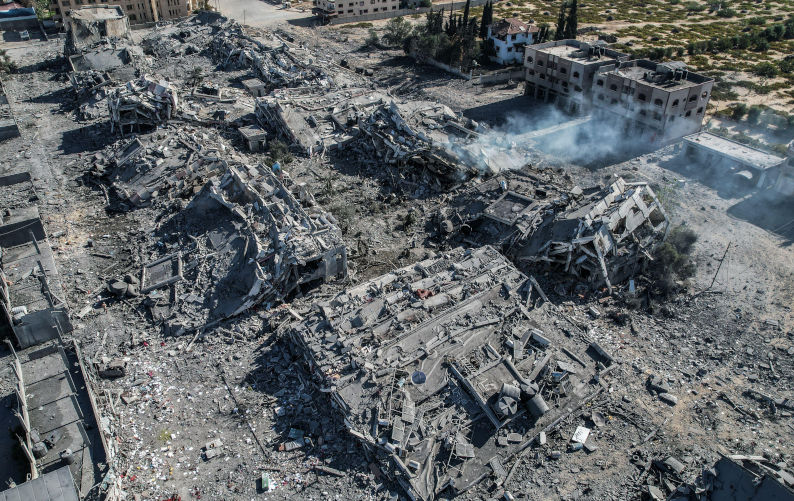Israel’s military campaign to rout the war machine and government authority of Hamas in the Gaza Strip has entered its sixth week. Its steady physical destruction of the terrorist organisation’s military capabilities above and below ground has left a trail of physical ruin and a growing humanitarian tragedy as hundreds of thousands of displaced Palestinian civilians evacuated their homes in the war zone in northern Gaza and fled to tent encampments in the south at the border with Egypt.
Despite Israeli transports daily into Gaza of food, medical supplies and fuel to service water desalination and hospital power plants to alleviate conditions for the refugee population, the situation could worsen if Israel’s War Cabinet decides to continue its military operations against Hamas operatives regrouping in the southern part of Gaza.
A United Nations Security Council ceasefire would halt the fighting and a call to establish a United Nations Mandate over the Gaza Strip would fill the vacuum left by the eviction of Hamas and before Israel withdraws its forces from the Strip.
The UN Mandate can comprise countries like Germany, Britain, France, Japan, Canada, Australia, Saudi Arabia and the Palestinian Authority. It would operate for a specified number of years and be responsible for civilian governance, reconstruction and economic development.
Israel has no interest to reoccupy and administer the Gaza Strip, Israeli Prime Minister Netanyahu said on several occasions, but would insist on exclusive responsibility for security and preventing terrorist attacks from Gaza into Israel.
With the reconstruction of the Gaza Strip a Diplomatic Horizon would open under the auspices of the U.S. Russia and China. They would sponsor negotiations for a final settlement of the borders and core issues of dispute between Israel and the State of Palestine comprising a corridor linking the Gaza Strip to the West Bank, the status of isolated Jewish settlements and establish a confederation between Israel, Palestine and Jordan. The conflict would end with the dissolution of Israel’s occupation of the West Bank.
A draft plan of these general ideas could move the conflict onto visible tracks building confidence and trust between Israel and the Palestinians to end the cycle of Palestinian terrorism and recurring Israeli operations to clean out strongholds of armed resistance in the West Bank contributing to an international atmosphere that reduces Antisemitic hostility toward Israel and Jewish communities around the world.
Israel and the Palestinians are both in collective trauma after the massacres of October 7th and subsequent retaliation. Their leaders must find ways to heal their societies before they can resume the task of genuine reconciliation.
Hamas cynically delivered a disaster to the Palestinian cause for independence and an end to Israel’s 56 year occupation of the territories captured in the Six Day War. The Jihadist terrorist organisation cannot be a partner to a process of national reconciliation after its barbarous massacre on October 7th of 1,200 Israeli civilians in rural and urban communities bordering the northern Gaza Strip and capture of 239 civilian hostages among them infants, children and their mothers and aged adults.
At the same time, general elections for President of the Palestinian Authority and members to its Legislative Assembly are long overdue. The Palestinian Authority needs an overhaul, to wipe out vibrant corruption and reform its institutions of governance to make them attentive to the welfare and quality of life of its citizens.
Israel must also put its house in order. Defence Minister Yoav Gallant and IDF Chief of the General Staff Herzi HaLevi publicly declared themselves accountable for the military debacle in the Gaza border area and the absence of armed forces to defend Israeli civilians from the atrocities committed by Hamas. Prime Minister Benjamin Netanyahu has not. Widespread public anger with him exists in his electoral base over his decades-long appeasement of Hamas and attempted judicial coup, his personal absence and that of his Ministers from hundreds of burial ceremonies held for victims of the atrocities.
Netanyahu has also avoided meeting with families demanding the immediate release of all hostages captured by Hamas, and with representatives of some 100,000 Israelis evacuated to safer accommodation from war zones in the Gaza Strip and with Hizballah at the Lebanese border.
The government must also put a stop to increasing violence by extremist Jewish settlers in the West Bank threatening Palestinian villagers to leave their homes, preventing them from harvesting their olive groves and destroying their crops.
Unless Netanyahu’s own party ousts him as their leader, countrywide mass demonstrations are certain to take place after the war ends calling on Netanyahu to resign and demands for general elections whose outcome, survey polls suggest, would be a resounding defeat for the Likud party.

Yehonathan Tommer
Yehonathan Tommer is an Australian journalist, translator and novelist living in Israel.”1944″1944. He has degrees in Political Science and International Relations from Melbourne and Monash Universities. He was a correspondent on Israel and the Middle East for news media in Australia, New Zealand, India and Canada.
